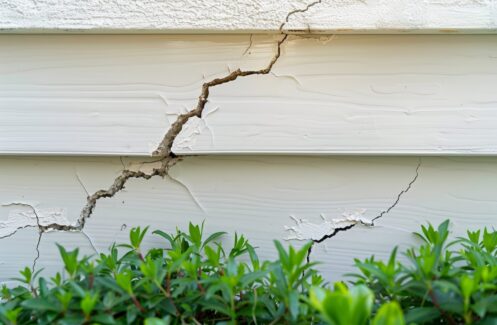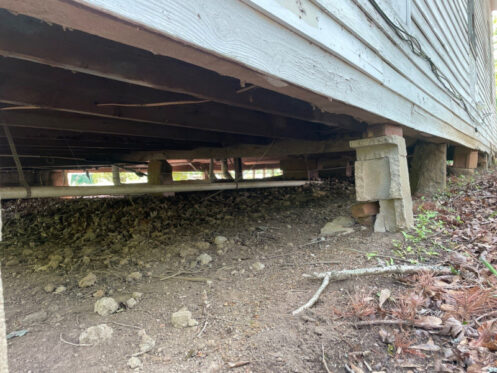Owning a home in North Carolina comes with many rewards, but it also means staying vigilant about maintenance, especially when it comes to the foundation. Foundation problems can develop slowly, and if left unaddressed, they may lead to costly structural repairs and impact the safety and value of your home. For homeowners in Charlotte and across North Carolina, understanding the early signs of foundation issues is essential for addressing problems before they escalate.
Here’s what to look for and why early detection is so important.
Why North Carolina Homes Are Susceptible to Foundation Problems
North Carolina’s diverse climate and soil composition contribute to foundation challenges in the area. Seasonal weather changes, including Charlotte’s heavy rain periods and occasional droughts, cause the soil to expand and contract. These shifts place pressure on your home’s foundation, leading to potential cracks and settlement issues.
Additionally, NC’s clay-heavy soil is highly absorbent, which means it can hold moisture from rain for extended periods. This ongoing soil movement and moisture retention create prime conditions for foundation issues to arise over time.
Recognizing Early Signs of Foundation Problems
Knowing what to look for can help you detect foundation problems early and prevent more significant issues. Here are some of the most common signs of foundation problems in North Carolina homes.
1. Cracks in Walls and Floors
Foundation issues often manifest in the form of cracks, and it’s important to differentiate between minor cosmetic cracks and those that indicate structural problems. Be on the lookout for:
- Horizontal cracks in walls: Horizontal cracks, especially those that appear along basement or foundation walls, may indicate excessive pressure from soil movement.
- Stair-step cracks in brickwork: If you see stair-step cracks along your exterior brickwork, it can be a sign that the foundation is shifting.
- Cracks wider than 1/8 inch: Even small cracks can indicate problems, but those wider than 1/8 inch are more likely to be a red flag.
Regularly inspecting both the interior and exterior walls of your home can help you catch these cracks early and assess whether further evaluation is needed.
2. Uneven or Sloping Floors
Another key indicator of foundation problems is uneven or sloping floors. If you notice that furniture or objects placed on the floor lean or roll on their own, it may be due to a shift in your foundation. Floors that feel bouncy or have dips may also suggest foundation issues. Walk around your home periodically, paying attention to any changes in the levelness of the flooring, especially in basements and lower levels of your home.
3. Doors and Windows Sticking or Misaligned
Doors and windows that start sticking, jamming, or refusing to close properly may be reacting to shifts in the foundation. Foundation problems can distort the frames, making it difficult for doors and windows to open and close as they should. Look for signs such as:
- Gaps around windows or doors: Misaligned windows or doors may leave visible gaps, which can let in drafts and pests.
- Cracks around frames: Cracks developing around door or window frames may indicate that the foundation is moving.
These signs should not be ignored, as sticking doors and windows often become progressively worse if the foundation issue continues to worsen. Contact a local expert for foundation repair in North Carolina.
4. Gaps Between Walls and Ceiling or Floor
When foundations shift, it can lead to separation between walls and ceilings or floors. In particular, check for:
- Gaps along the ceiling and wall junctions: Gaps here suggest that the walls may be pulling away from each other as a result of foundation movement.
- Spaces at the bottom of walls where they meet the floor: This can indicate settlement and should be evaluated by a professional.
These gaps are a sign that the structure of your home is being affected by an unstable foundation and should not be ignored.
5. Water Pooling Around Your Foundation
Water pooling near your foundation after heavy rains or irrigation is not just a cosmetic issue—it can lead to foundation problems. Excess moisture in the soil surrounding your home creates pressure against the foundation walls and can cause cracks or even basement flooding.
To reduce the risk, ensure that gutters and downspouts are in good repair and directing water at least six feet away from your foundation. Consider grading the landscape around your home to help keep water from pooling near the foundation. Regularly check for signs of water pooling, especially during Charlotte’s rainy season, to avoid foundation problems that result from hydrostatic pressure.
6. Mold and Mildew in Basements or Crawl Spaces
Foundation problems can lead to water seepage into basements and crawl spaces. Dampness encourages mold and mildew growth, which can negatively impact indoor air quality and pose health risks. If you notice a persistent musty smell or see mold forming along the walls or floors in these areas, it’s worth investigating further.
Additionally, if water intrusion is leading to mold, it’s likely a sign that cracks or gaps in the foundation need attention. Mold is often a secondary symptom of a larger issue with the foundation, so addressing the root cause is essential.
7. Sagging or Bowing Walls
Bowing walls, particularly in basements, can signal severe foundation problems. When soil pressure becomes too great, it can push foundation walls inward, causing them to bow or lean. This is often due to hydrostatic pressure and can lead to serious structural issues if not addressed quickly.
If you notice walls in your basement that are beginning to curve or lean, it’s time to call a foundation expert. Sagging walls are a critical sign of foundation problems that should be dealt with as soon as possible to prevent further damage.
| Sign | What to Look For | Why It Matters |
|---|---|---|
| Cracks in Walls and Floors | Horizontal, stair-step, or wide cracks (>1/8 inch) | May indicate structural movement |
| Uneven or Sloping Floors | Floors that slope, dip, or feel bouncy | Suggests foundation settlement/shifting |
| Doors & Windows Sticking/Misaligned | Sticking, gaps, or cracks around frames | Frames may be distorted by movement |
| Gaps Between Walls & Ceiling/Floor | Visible spaces at wall/ceiling or wall/floor junctions | Indicates separation from shifting |
| Water Pooling Around Foundation | Puddles near foundation after rain | Leads to hydrostatic pressure, cracks |
| Mold/Mildew in Basements/Crawl Spaces | Musty odors, visible mold, persistent dampness | Signals water intrusion, health risk |
| Sagging or Bowing Walls | Walls that curve or lean inward, especially in basements | Sign of severe soil or water pressure |
What To Do if You Notice Signs of Foundation Problems

If you observe one or more of these signs, consider reaching out to a professional for an assessment. Foundation problems can worsen over time, so early detection and repair can save you time, stress, and money in the long run. A foundation specialist, like RhinoLift Foundation Solutions in Concord, NC, can provide a thorough evaluation of your home’s foundation and recommend the best solution for stabilizing and protecting it.
Depending on the severity and type of foundation issue, solutions can vary. Here are a few common foundation repair methods:
- Foundation piers: These provide support for homes experiencing settlement issues.
- Wall anchors: Installed to stabilize bowing walls.
- Carbon fiber reinforcement: Reinforces basement walls to prevent future bowing.
- Crack injections: Seals small cracks to prevent water intrusion.
A foundation specialist will evaluate your home to determine the most effective repair solution based on the specific issues your foundation is experiencing.
Trust RhinoLift Foundation Solutions for Foundation Repairs in Charlotte, NC
For homeowners in Charlotte and throughout North Carolina, RhinoLift Foundation Solutions is a trusted partner in foundation repair. Located in Concord, NC, RhinoLift specializes in identifying and repairing foundation issues to help protect your home from further damage. Our experienced team understands the unique challenges faced by North Carolina homes, from heavy rainfall to shifting clay soil, and offers expert solutions to keep your foundation strong and secure.
If you’re seeing early signs of foundation problems, don’t wait. Reach out to RhinoLift Foundation Solutions today to schedule a professional assessment. Protecting your home’s foundation is crucial to preserving its value and your peace of mind.
Frequently Asked Questions
Does homeowner’s insurance cover foundation repairs?
Most standard homeowner’s insurance policies do not cover foundation repairs caused by soil movement, settling, or water intrusion. Coverage may be available for sudden events like plumbing leaks, but it’s best to review your policy or consult your agent for details.
How often should I have my foundation inspected?
It’s a good idea to have your foundation professionally inspected every 2 to 3 years, or immediately if you notice any warning signs such as cracks, sticking doors, or water intrusion.
Can I fix small foundation cracks myself?
Hairline or cosmetic cracks can sometimes be sealed with store-bought products. However, if cracks are widening, recurring, or accompanied by other issues (like sticking doors or water seepage), it’s best to have a professional evaluate the problem to prevent further damage

